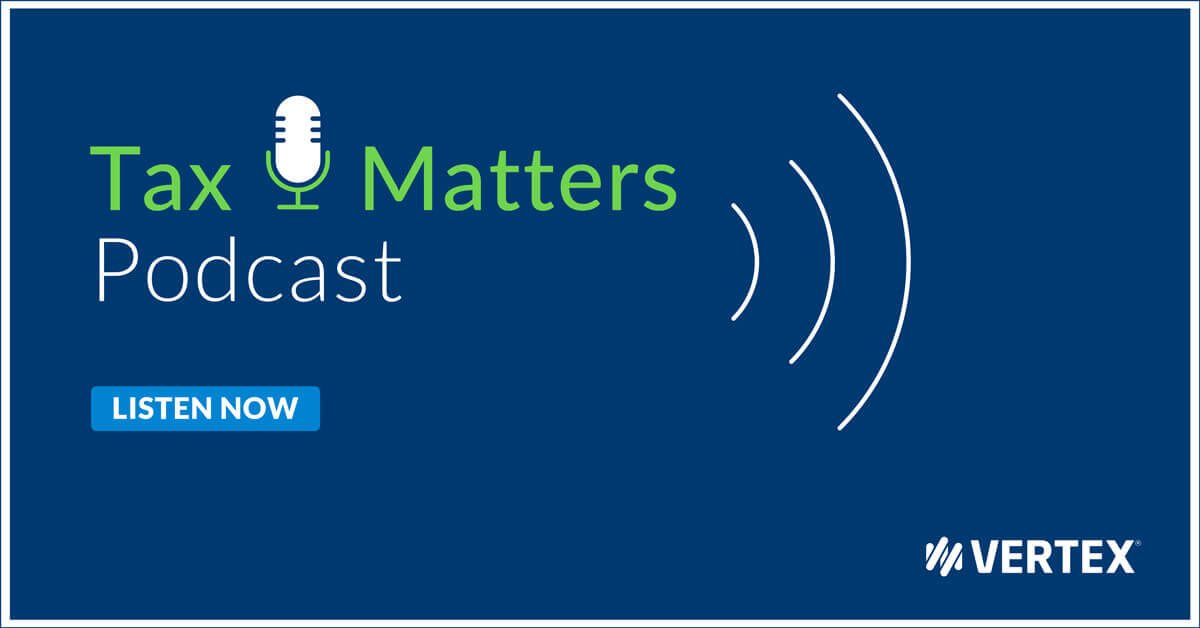Introduction
Welcome to Tax Matters, a Vertex podcast! I’m Rachel Litcofsky, Manager, Public Relations, at Vertex.
In this episode, Vertex Vice President of Tax Content and Chief Tax Officer Michael Bernard discusses fiscal and policy trends driving changes to U.S. sales tax rates. Mike and business writer Eric Krell also highlight key findings from Vertex’s 2022 Year-End Sales Tax Rates and Rules report.
It was a busy year for rate changes, especially among sub-state jurisdictions. Mike delves into reasons for the elevated number of city tax rate changes and the near-record number of district changes. He also forecasts how a likely recession will influence rate changes during the next 24 months.
Now, I’ll turn it over to Mike and Eric.
Eric Krell: Mike, 2022 was a doozy: Before we get to the sales tax rates and rules data, give us some context about the larger tax policy environment. What should tax pros keep in mind from a macro perspective?
Michael Bernard: Well, first of all, Eric, it’s good to be with you again. And yeah, a lot of things have gone on in 2022… At the macro level, as most of our listeners know, there are three key ways of funding state and local governments: one is the income tax, two is property tax, and three is sales and use tax. Before I get to sales and use tax, I want to make a couple comments about income and property taxes. I think most people understand that over the last couple of years, income tax receipts have actually gone down. That’s basically been due to the pandemic. Some industries have done very well and some have suffered…. In terms of property tax, we saw kind of a boom in residential real estate, but that boom is now over given the costs of [high] interest rates…Couple that with the fact that there’s a record amount of office space on the market today -- almost a ten year high. A lot of real estate valuations are going down, at least on the business side. That affects receipts on the property tax side…Property tax receipts are going to be under pressure over the next couple of years.
So, if I’m a legislator … the one thing I look at to sustain funding is the sales tax. As we know, sales tax [revenue] declines faster, but also recovers faster, in times of economic stress …. [There] is a lot of pressure on the sales tax at this point, at least moving forward. The [tax] base is about as narrow as it’s been over the past 60 or 70 years… that comes from a report by the tax foundation. There are some things to think about in terms of where funding is going to come from, particularly as it relates to the sales and use tax.
Eric Krell: Turning to the report, the total number of rates and rules changes decreased this year, but there’s more to the story. How large was the decline and what are some of the factors behind it?
Michael Bernard: A couple of things. If there was a decline in new district taxes and/or new state and local taxes, that decrease [was modest]… To the extent that they did drop, there’s still a record number of district taxes that are being imposed. In terms of granularity, Eric, there are still record numbers of state, local, district, and city taxes that [Vertex] customers have to be aware of; when those taxes are imposed, they have to get those things right. Still a record number, but trending down just slightly.
Eric Krell: To your point, Mike, in the past 10 years so we’ve had an incredibly high volume of new district taxes come online. While the figures for 2022 show a decline there, the number of changes to district-level taxes is near an all-time high. Is that something you see continuing in 2023?
Michael Bernard: I think you’re going to have to assume that changes will continue because the need for funding is really there … This is obviously something that’s just going to continue.
Eric Krell: You mentioned locals. What about city rate changes – what happened at that level in 2022?
Michael Bernard: …We saw an average of about 233 city rate changes over the past five years. That was pretty much an all-time high looking back over 10 years. I will say that of the nearly 230-plus changes we saw in 2022, 200 have been a rate increase. That shouldn’t really surprise anybody. If you think about it, Eric, as consumers we’re paying more for everything that we consume. Governments aren’t immune to that, so their costs have gone up. The fact is that almost 85% of cities are reporting tax increases, and [we expect] that trend to continue in 2023 as well.
Eric Krell: You mentioned inflation. What are some of the factors – or, better put: how does inflation manifest itself in fiscal pressure on cities that’s driving them to increase rates? How are they feeling the hurt?
Michael Bernard: I think one thing that we saw over the last two years is that cities tried to adjust to the pandemic in many different ways. They’ve either cut their labor forces or they’ve tried to find the best partnerships they can in terms of the [products and services] that they’re consuming… They’ve probably taken on some debt as it relates to funding capital or -- hopefully not, but in some cases -- operational costs. They’ve been working on those things the last couple of years. I think one of the things that you’re going to see for the city rate increases is this: because of inflation and because of all these things that they’ve done to try and get their costs down and in line, [costs[ are still rising for them. So, they necessarily have to continue to increase their revenues even though maybe their services aren’t improving or they may not be able to provide as many services. But they certainly have to keep pace with the costs that they’re incurring.
Eric Krell: The National League of Cities publishes an annual report on fiscal conditions. It’s current report -- this is for 2022 -- warns of a looming recession and a “lag” between economic conditions and city revenue collections. Tell me about that lag.
Michael Bernard: First of all, that’s a really great report you referenced and I would encourage anybody on the podcast, if you’ve got some time, go and look at that. There’s some really good learnings in there, particularly in the executive summary upfront.
I think what you’ll see is that there’s a lag in revenues anywhere from two, to six, to maybe eight quarters [following a downturn]. Some of that is just because there are different responses [among] businesses and to consumers in terms of how quickly they tighten their belts and how quickly their spending may move in or out of a city… Forecasting these types of things is kind of tough but ... most economists agree that there’s going to be a recession in 2023. We don’t know how deep it’s going to be. There’s going to be some effects on receipts. [I]t won’t hit all at one time but there’ll probably be a lag and then part of that lag is also the recovery…
Eric Krell: Before we go can you highlight for us any fiscal or tax compliance trends that you think will loom large in 2023?
Michael Bernard: One is that we haven’t seen a real movement yet from states and locals to start taxing what I would call “professional services” -- accounting, management fees, those kinds of things. They’re going to have to make a decision as to whether or not they’re going to start taxing a broader [swath] of the services sector because, as I mentioned earlier in the podcast, the base is about as narrow as it’s been for a long time.
…The second consideration is that there are these enormous economic factors that will continue to put pressure on states and locals. They’re going to need money to continue the services that they have. Rates necessarily will have to trend up. If other businesses are recovering -- particularly those in the hospitality, travel services and energy sectors – and they continue to recover and add revenues to state and locals, that will be good. But if there’s any slippage … due to a recession, then obviously that’s going to affect receipts. And that will bring some kind of response from government officials. I’ll [also] say that a lot of governments are going to be cautious about imposing higher tax rates on consumers … because there’s been a big run-up during last couple years in [sales taxes]. We also saw in the midterm elections that there was a reluctance from voters to vote for a tax increase as it related to sales and use tax. [Consumers] are wary from all of the taxation and challenging things they’ve gone through during the pandemic.
Lastly, one thing that is big but has not been broadly reported on is that all of the ARPA funds that came out of the federal tax act passed in March of 2021 are going to be running out. They’ll be paid out in 2023 and 2024. Significant amounts [of pandemic relief] made its way into local coffers. And that’s actually going to have some effect … [state and local governments] are going to have to make up some money there. There are just a lot of things to consider at this point.
Eric Krell: Definitely. Thank you Mike. We appreciate you sharing your insights today.
Michael Bernard: Always good to speak with you Eric. Take care.
Rachel Litcofsky: Thank you for listening to Tax Matters, a Vertex podcast…Check back here for more episodes soon.
Note: This transcript has been edited for clarity.



